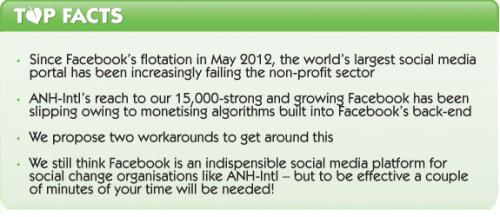Have you ‘Liked’ us on Facebook? Not receiving our posts? Then you’re in the great majority – and we’d love for you to use our quick solutions. This problem, which hits non-profits like ANH-Intl especially hard, is linked to Facebook’s flawed business model and what appears to be sheer greed. And although Facebook may be on the verge of a spectacular fall, its unique strengths mean we can’t just go elsewhere – at least for now. We’ll explain.

How to help us help you – in less than 5 minutes!
Our Facebook community at ANH-Intl is nearly 15,000 strong. You may very well be part of it. Before you go any further, we’d love you to take one of the following quick actions to ensure our posts appear in your News Feed/Home page:
Workaround 1: Enable notifications
This is the quicker but slightly less effective workaround.
- Make sure you ‘Like’ the ANH-Intl Facebook page if you haven’t already
- Hover your cursor over the ‘Liked’ button
- Now click on the ‘Get Notifications’ option in the drop-down menu that appears.
A tick should now appear next to the option – of course, if it’s already ticked, you don’t need to do anything, and you should have been receiving our posts anyway.
Workaround 2: Add ANH-Intl to an interest list
This is only slightly more complex than enabling notifications and offers advantages both for you and for us. Here’s what you do:
- Go to our Facebook page
- Hover your mouse over the ‘Liked’ button
- On the drop-down menu, click ‘+ New List’
- Click ‘Pages’ in the menu on the left-hand side of the box that pops up, and you should see a listing of all the Pages you like
- Select all the Pages whose posts you want to see on your News Feed/Home page, including ANH-Intl
- Give your list a name (e.g. ‘Health pages’)
- Click ‘Done’.
Limiting the Reach
In recent months, Facebook appears to have used its EdgeRank algorithm to clamp down even further on the distribution of posts. From an average ‘Reach’ of around 16% in July 2012, we optimistically estimate our posts now reach an average of just 3.4% (500 of 14,800) of our followers. As one commentator puts it, through EdgeRank and the ‘Promoted Posts’ feature, Facebook “treat[s] all entities on the site as advertisers and charg[es] them to share their content.” For non-profits like us, this is bad news.
As an organisation funded exclusively by donations, we're trying very hard to make every donated penny or cent go as far as possible to achieve our natural health mission. We simply can’t afford to pay Facebook to promote our posts. Frankly, our limited funds can be far more usefully employed elsewhere – which is why we hope you’ll take advantage of one or other of the simple solutions proposed above!
Staring into the Facebook of disaster
Facebook’s ongoing drive, since its flotation in May 2012, toward a ‘pay-per-post’ system affects everyone except individual users: non-profits, businesses and page owners of such things as music review sites all potentially need to promote their posts in order for their followers to receive them. So, how have these Facebook users responded to its new business model?
The answer is simple: by leaving it in droves. Academics suggest that Facebook will lose 80% of its users between 2015 and 2017. This decline is the result of many factors, including a perception among teens – its core demographic – that Facebook is no longer cool. After all, who wants to receive a friend request from their parents? We strongly suspect that Facebook’s blatant attempts to strong-arm users into paying for promoted posts is another significant factor, one that is fuelling a rise in alternatives to the social media titan.
The atomisation of social media
Kieran Hannon, of social media consultants eSocialMedia, agrees. “Promoted Posts is an unfortunate feature that was driven by Facebook’s need for monetisation following its launch on the stock market,” he said in an interview with ANH-Intl. “It’s not completely bad – for example, if you’re sending out lots of posts every day, EdgeRank and Promoted Posts prevent people’s News Feeds from becoming too cluttered. But non-profits have no option but to negotiate with Facebook about some kind of cost reduction or exemption for Promoted Posts.”
Hannon, however, doesn’t believe that Facebook is under imminent threat of extinction. “Facebook is so big that it’s attained a kind of critical mass. Around 12% of the world’s population use it, and the numbers are increasing. So people will continue to use it. However, I think that enough people are becoming disillusioned with Facebook that we’ll see the growth of specialist social media communities.” These communities will focus on specific worldviews, campaigns and visions, and will “align with offline communities,” according to Hannon.
Divide and conquer
Which is all well and good. But there is a problem. Social media sites like Informed Planet may one day do a great job of connecting socially, environmentally, health- and spiritually aware people from around the world, without stealing their personal data or sharing it with government agencies. But these people will be talking to themselves: doubtless doing great work, discussing powerful ideas and enacting useful change – but still unavoidably stuck in a self-contained bubble. While the activists connect, the rest of the world carries on regardless. The beauty of Facebook’s enormous popularity was that organisations like ANH-Intl could potentially connect with millions of people, like-minded, antagonistic or on the fence – for free. Now, that has changed, and a worldwide community appears on the brink of splintering into factions once again.
Call to Action
It might be tempting to see this as a deliberate continuation of the tried-and-tested ‘divide and conquer’ strategy so beloved of elites throughout history. But rather than walking away, going elsewhere or giving up, we’re proposing that we should jointly do what we can to keep our own Facebook community together. After all, for the moment Facebook remains by far the most popular social media platform to which most of us have easy access.
All you need to do is follow one or other of the two workarounds we’ve shown above.








Comments
your voice counts
29 January 2014 at 9:35 pm
Thanks for this article. It explains a lot.
Your voice counts
We welcome your comments and are very interested in your point of view, but we ask that you keep them relevant to the article, that they be civil and without commercial links. All comments are moderated prior to being published. We reserve the right to edit or not publish comments that we consider abusive or offensive.
There is extra content here from a third party provider. You will be unable to see this content unless you agree to allow Content Cookies. Cookie Preferences